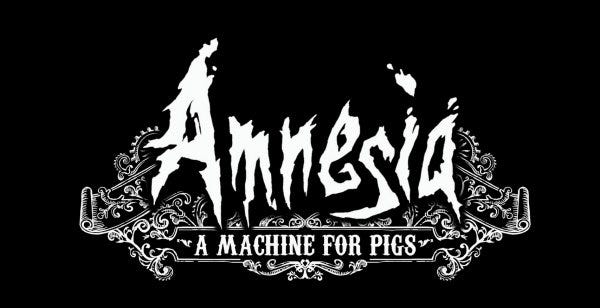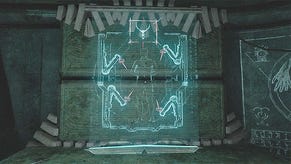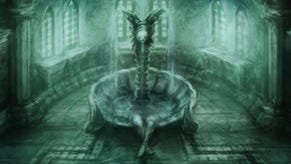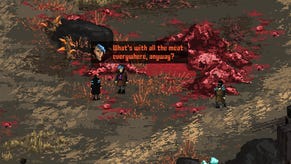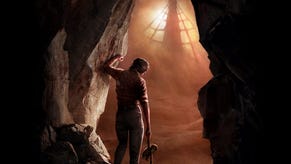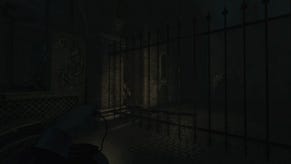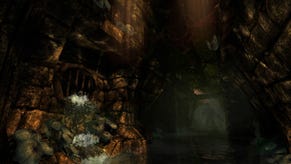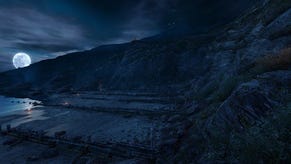Wot I Think: Amnesia - A Machine For Pigs
Cages on the beds
Fear is the event of the season. We shouldn't be surprised. As Ol' Grandfather Gillen pointed out so long ago, it's something that games are good at. It might be the thing that they are best at. Amnesia: The Dark Descent was one of the highlights in that regard: a world where vulnerability and atmospherics smothered you like the pillow in the hands of a maniac. Its sequel, A Machine For Pigs, wants to pull off the same tricks. Only more. Only worse.
The horror? The horror? Here's wot I feel.
A Machine For Pigs is set in Victorian London, initially in a fabulous (and deeply sinister) mansion, and then in the works of some large industrial complex, adjacent to and beneath the mansion itself. The protagonist, the person in the “first-person” of this horror, is Oswald Mandus, who has woken to find he cannot remember the intervening months. Immediately he sets out to find his children, muttering about his worries for them. You begin to find things amiss: cages on the beds, a house full of disturbing objects, and the darkness of the situation rapidly escalates. Mandus' is an unreliable first-person narrator, and it's not clear whether some of what he sees is “real” in the context of the game. Some of it is real, however, and what he sees means the horror of what has happens spirals out into unfathomable ghastliness.
It is a game space filled with moments of dread. Even static things have a capacity to worry, because they are imbued with terrible implication. Someone had been trying to bury something in the graveyard. It was the corpse of a pig, and something else that looked like a pig.
But it wasn't a pig.

A Machine For Pigs is deeply faithful to Dark Descent, and it probably suffices to say that those who enjoyed the previous game are already – rightfully – on board with this sequel. It has the same sense of looming threat, but it is larger, and filled with far more impressive environments. It's certainly as frightening as its predecessor, at least in individual moments, if not as a sum. Dark Descent simply left a strong residue of fright. There's no sanity meter, either. Which is understandable, but a big loss to the overall experience.
As Mandus' search for his children becomes more frantic, so the narrative begins to creep its way in. Recording devices, telephone calls, visions and hallucinations, recollected conversations, and Mandus' own mutterings all feature. These elements are handled well in parts, and not in others. I was put off by the frequent telephone calls from “the engineer”, even though that presence in the game was so of sensibly delirious, and urgent. It nevertheless felt unnecessary. The structure and atmosphere of the game carries you along without such narration tricks, and I am not sure the engineer's added urgency really helped other than to point out that this is, of course, an elaborate haunted house/ghost train. Which is something developers need to avoid doing.
I mean no disrespect in this. Some people will never get on with this sort of design, admittedly, but it's a linear horror game, so of course it's going to be based around scares, dangers, puzzles, and set-piece spooks, but it's the times when you are take away from the total absorption in the game's atmosphere that you begin to become aware of its tricks. Horror design is about concealing that, and constantly maintaining the sense of threat. Some aspects of A Machine For Pigs' story-telling seem to meddle with that too much.
One point at which this breaks down for A Machine For Pigs, is that it overdoes the “glimpse of something” spookiness towards the start, so that when I did eventually encounter one of the true, physical abominations that stalk the game, I expected it to disappear. Rather than being horrified when it did attack me, I was just surprised and annoyed. I suppose that surprise could have been the intention, but it didn't quite play out in a way that informed horror.
Another aspect which grated was the children-as-apparitions aspect, which time and again haunts horror games and films. There is, frankly, nothing scary about the distant spectral laughter of children, at least not when you've heard it a thousand times before. It's something I would like to have seen given as much thought and imagination as the rest of the game, which is, well, brilliant.

I could probably recommend A Machine For Pigs purely on the basis of its sound design. Few games pay as much attention to piling tension and startling you with sonics in the way that this does. It staggers violently between throbbing threat and violent, shuddering screams: sometimes of pigs, sometimes of tortured metal and failing machines, always of something that puts needles into that bit of your phrenology marked RUN AWAY. Going to open a door and having it BANGBANGBANGHOWL in your face is enough of a jump scare, but when the sound goes on and implies some vast machine starting up in the Earth beneath you, and architecture is buckling and coming down around you, and then pigs are screaming on the other side of the walls.
Oh god.
It escalates, too. The initial game is tense, and disturbing, but as you descend into the machine, things become almost unbearable. I had to take my headphones off and go and stand in the sun at one point in the midst of the game, before sitting down and forcing myself to stop being a wuss. Power through, Rossignol.
As before, this is a game without weaponry – there's a rifle on the wall in the mansion, which the devs knew everyone who played the game would go up and click on – and so Machine For Pigs has a focus on puzzles and physicality which is wholly admirable. Few games remember that we're in an age where physics manipulations of all kinds of objects are now not only possible, but also wholly understood by players. That bit at the start of Half-Life 2 where we have to put the can in the bin to proceed? That taught a generation that first-person physics was going to be a thing. Amnesia is one of the few games that remembers that lesson. If only it remembered it consistently throughout the game. If only all the design had been based upon that ideal, as it had in Dark Descent.
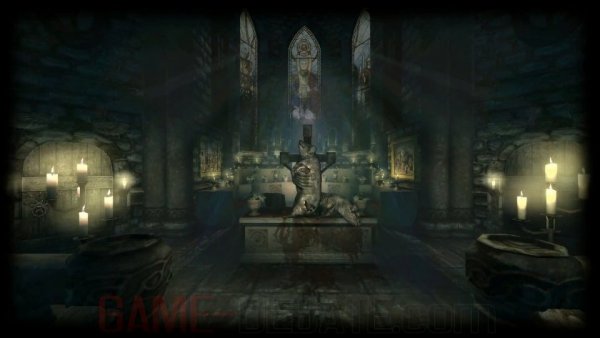
The puzzles range from obtuse and frustrating to completely brilliant. I won't spoil any, but there are a couple that made me smile with joy – they made me feel smart for getting them – and some others which made me sigh. The sighs were never enough to put me off, however, even though they were frequent. Too often found myself pulling levers at random. The AI, too, provides us with some things to worry about. You can usually escape just by legging it, but there are times when the randomness of the creatures wrongfoots you, and ugh.
I don't know if A Machine For Pigs is the scariest game that we'll see this year, and I haven't played Outlast, which made precisely that claim. What I do know is that – my listed reservations aside – this is a marvellous, revolting, disturbing sequel to Dark Descent. I am certain that it will be loved and feared. It coils atmosphere around the player, and the central metaphor of the pigs is one that you will be repulsed to explore. Its aim was to create horror. And from the moment I exited the mansion and began to find my way into the dark interior of the game, I knew they'd succeeded.
Amnesia: A Machine For Pigs is available September 10th 2013.
